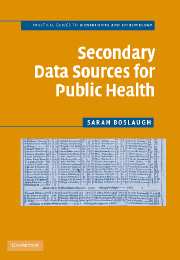Book contents
- Frontmatter
- Contents
- Preface
- Acknowledgments
- 1 An Introduction to Secondary Data Analysis
- 2 Health Services Utilization Data
- 3 Health Behaviors and Risk Factors Data
- 4 Data on Multiple Health Topics
- 5 Fertility and Mortality Data
- 6 Medicare and Medicaid Data
- 7 Other Sources of Data
- Appendix I Acronyms
- Appendix II Summary of Data Sets and Years Available
- Appendix III Data Import and Transfer
- Bibliography
- Index
3 - Health Behaviors and Risk Factors Data
Published online by Cambridge University Press: 03 December 2009
- Frontmatter
- Contents
- Preface
- Acknowledgments
- 1 An Introduction to Secondary Data Analysis
- 2 Health Services Utilization Data
- 3 Health Behaviors and Risk Factors Data
- 4 Data on Multiple Health Topics
- 5 Fertility and Mortality Data
- 6 Medicare and Medicaid Data
- 7 Other Sources of Data
- Appendix I Acronyms
- Appendix II Summary of Data Sets and Years Available
- Appendix III Data Import and Transfer
- Bibliography
- Index
Summary
This chapter discusses three major surveys that collect data regularly and at a national level on health behaviors and behavioral risks to health in the United States. The Behavioral Risk Factor Surveillance System (BRFSS) collects data annually from community-dwelling adults (age 18 and older) on a broad range of health behaviors and risks. The Youth Risk Behavior Surveillance System (YRBSS) collects data on a smaller number of risk factors in odd-numbered years from ninth- through twelfth-grade students. Monitoring the Future (MTF) collects data annually and focuses on the use and abuse of alcohol, tobacco, and drugs among students attending the eighth, tenth, and twelfth grades. It also collects data in an ongoing follow-up study of a sample of students originally included in the MTF sample as twelfth-graders.
The Behavioral Risk Factor Surveillance System
The BRFSS is a survey of behavioral risks to health among American adults conducted annually by the CDC in cooperation with state health departments. Preliminary surveys were conducted in the years 1981 to 1983, and the BRFSS officially began collecting data in 1984 with fifteen states participating. Since 1994, all fifty states, the District of Columbia, and the territories of Puerto Rico, Guam, and the U.S. Virgin Islands have been included in the BRFSS.
Focus
The primary focus of the BRFSS is collecting data on individual health and health risk behaviors, using sampling techniques that allow accurate estimates of those behaviors at the state and national levels.
- Type
- Chapter
- Information
- Secondary Data Sources for Public HealthA Practical Guide, pp. 34 - 46Publisher: Cambridge University PressPrint publication year: 2007



